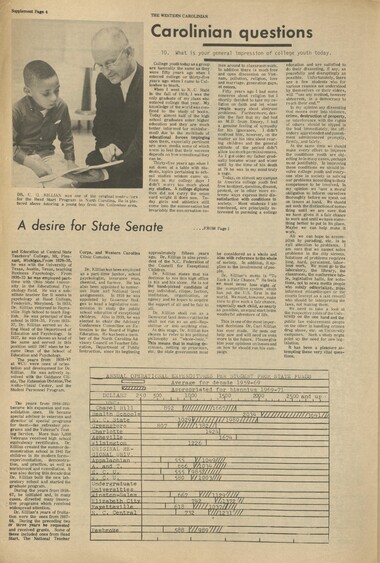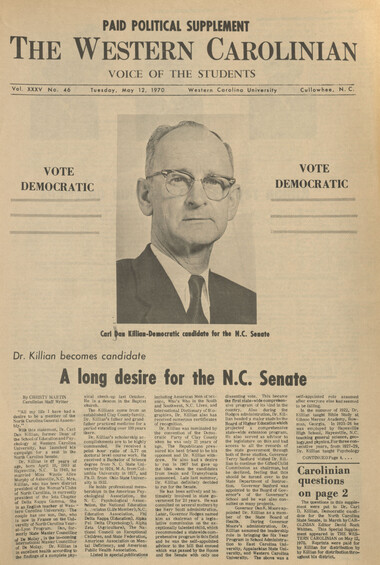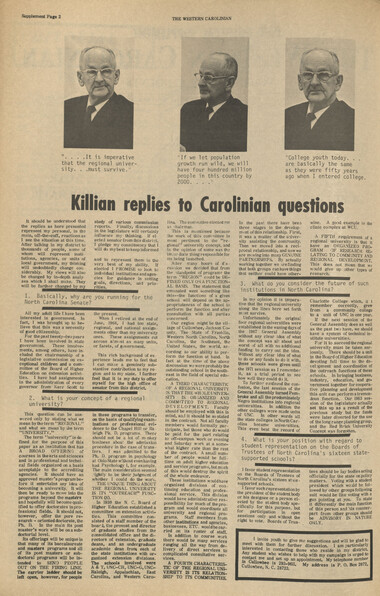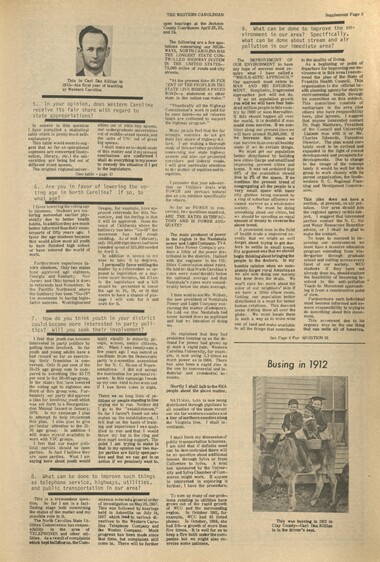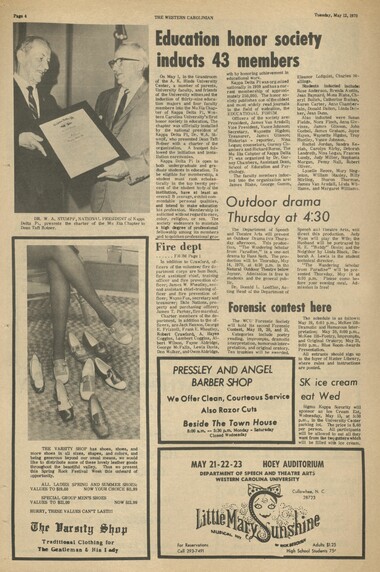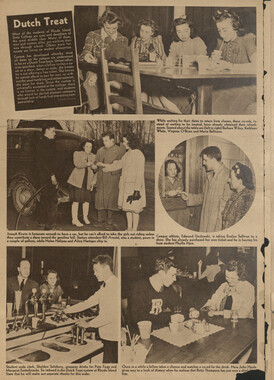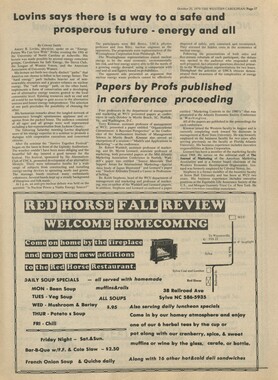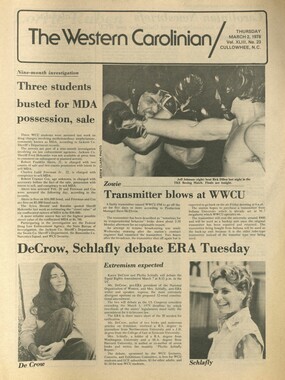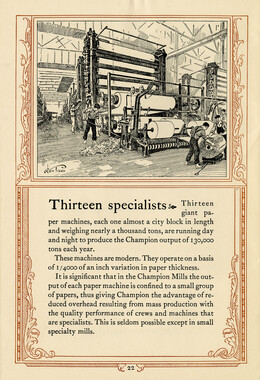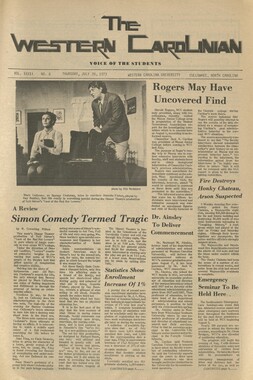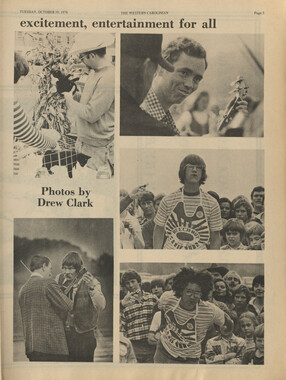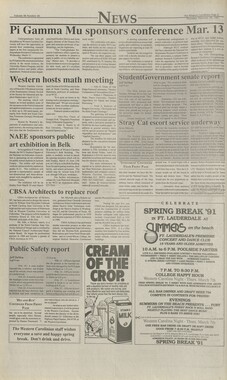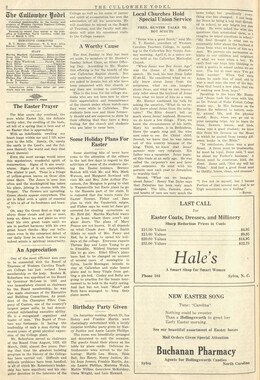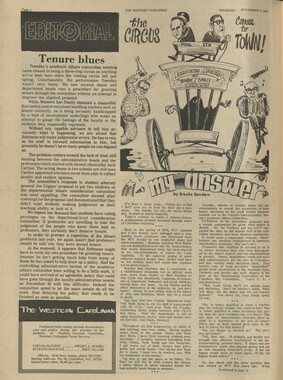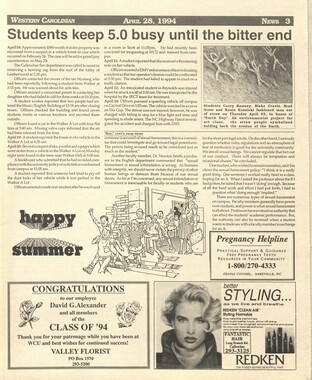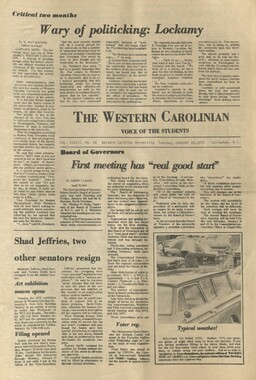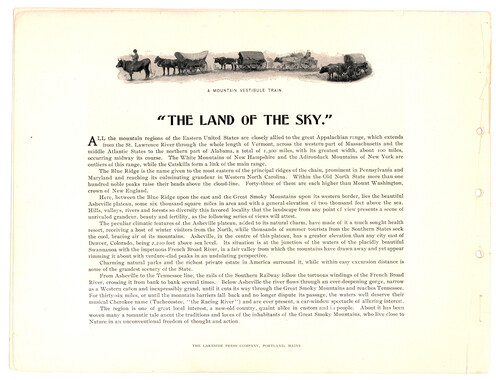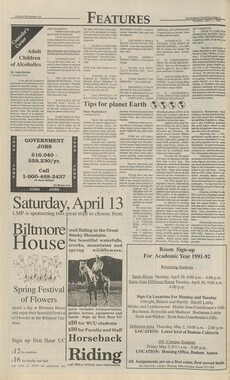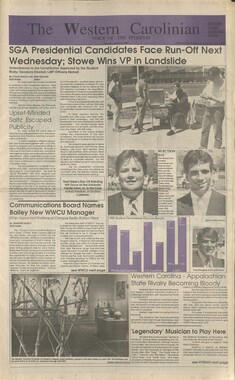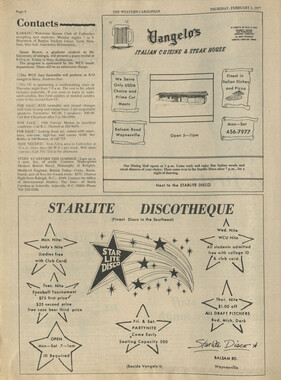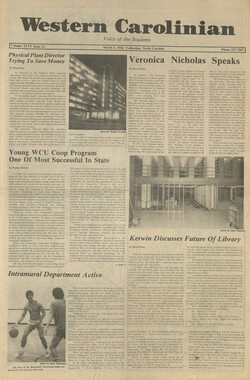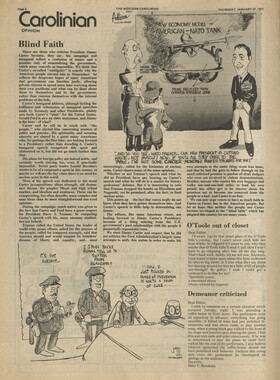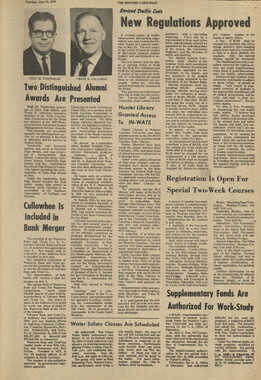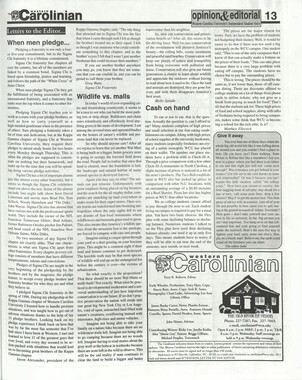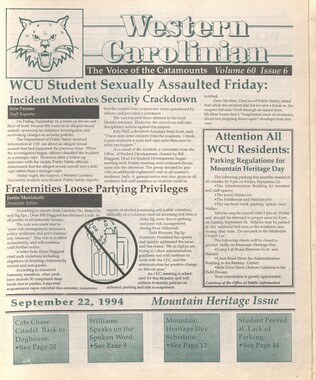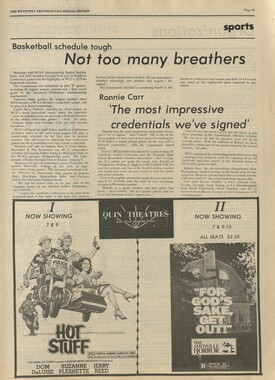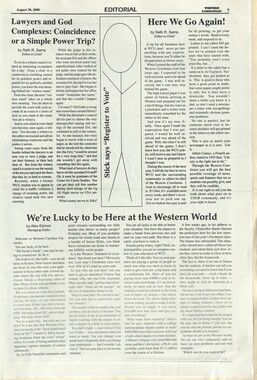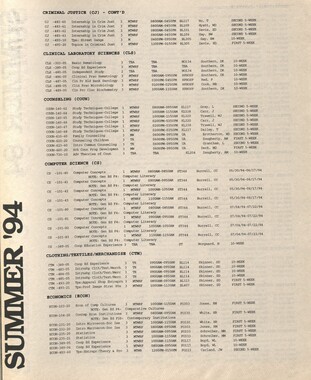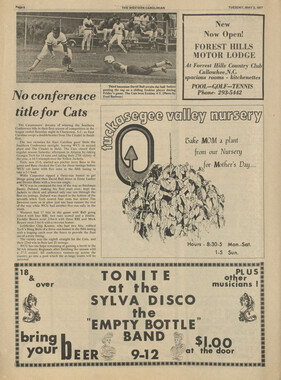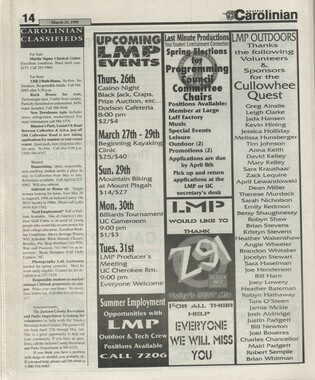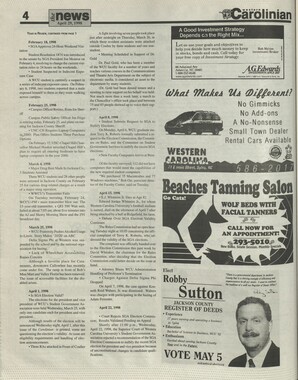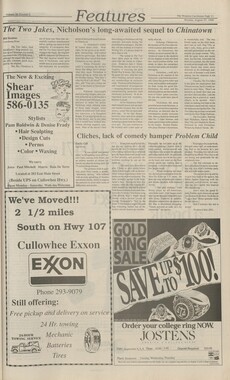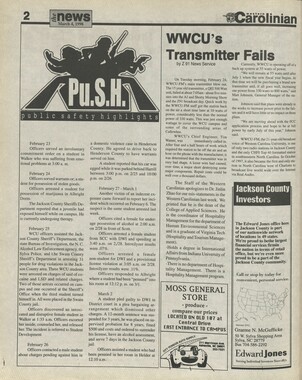Western Carolina University (20)
View all
- Canton Champion Fibre Company (2308)
- Cherokee Traditions (293)
- Civil War in Southern Appalachia (165)
- Craft Revival (1942)
- Great Smoky Mountains - A Park for America (2683)
- Highlights from Western Carolina University (430)
- Horace Kephart (941)
- Journeys Through Jackson (154)
- LGBTQIA+ Archive of Jackson County (15)
- Oral Histories of Western North Carolina (314)
- Picturing Appalachia (6679)
- Stories of Mountain Folk (413)
- Travel Western North Carolina (160)
- Western Carolina University Fine Art Museum Vitreograph Collection (129)
- Western Carolina University Herbarium (92)
- Western Carolina University: Making Memories (708)
- Western Carolina University Publications (2283)
- Western Carolina University Restricted Electronic Theses and Dissertations (146)
- Western North Carolina Regional Maps (71)
- World War II in Southern Appalachia (131)
University of North Carolina Asheville (6)
View all
- Allanstand Cottage Industries (62)
- Appalachian National Park Association (53)
- Bennett, Kelly, 1890-1974 (1295)
- Berry, Walter (76)
- Brasstown Carvers (40)
- Carver, George Washington, 1864?-1943 (26)
- Cathey, Joseph, 1803-1874 (1)
- Champion Fibre Company (233)
- Champion Paper and Fibre Company (297)
- Cherokee Indian Fair Association (16)
- Cherokee Language Program (22)
- Crowe, Amanda (40)
- Edmonston, Thomas Benton, 1842-1907 (7)
- Ensley, A. L. (Abraham Lincoln), 1865-1948 (275)
- Fromer, Irving Rhodes, 1913-1994 (70)
- George Butz (BFS 1907) (46)
- Goodrich, Frances Louisa (120)
- Grant, George Alexander, 1891-1964 (96)
- Heard, Marian Gladys (60)
- Kephart, Calvin, 1883-1969 (15)
- Kephart, Horace, 1862-1931 (313)
- Kephart, Laura, 1862-1954 (39)
- Laney, Gideon Thomas, 1889-1976 (439)
- Masa, George, 1881-1933 (61)
- McElhinney, William Julian, 1896-1953 (44)
- Niggli, Josephina, 1910-1983 (10)
- North Carolina Park Commission (105)
- Osborne, Kezia Stradley (9)
- Owens, Samuel Robert, 1918-1995 (11)
- Penland Weavers and Potters (36)
- Roberts, Vivienne (15)
- Roth, Albert, 1890-1974 (142)
- Schenck, Carl Alwin, 1868-1955 (1)
- Sherrill's Photography Studio (2565)
- Southern Highland Handicraft Guild (127)
- Southern Highlanders, Inc. (71)
- Stalcup, Jesse Bryson (46)
- Stearns, I. K. (213)
- Thompson, James Edward, 1880-1976 (226)
- United States. Indian Arts and Crafts Board (130)
- USFS (683)
- Vance, Zebulon Baird, 1830-1894 (1)
- Weaver, Zebulon, 1872-1948 (58)
- Western Carolina College (230)
- Western Carolina Teachers College (282)
- Western Carolina University (1794)
- Western Carolina University. Mountain Heritage Center (18)
- Whitman, Walt, 1819-1892 (10)
- Wilburn, Hiram Coleman, 1880-1967 (73)
- Williams, Isadora (3)
- Cain, Doreyl Ammons (0)
- Crittenden, Lorraine (0)
- Rhodes, Judy (0)
- Smith, Edward Clark (0)
- Appalachian Region, Southern (2393)
- Asheville (N.C.) (1886)
- Avery County (N.C.) (26)
- Blount County (Tenn.) (147)
- Buncombe County (N.C.) (1664)
- Cherokee County (N.C.) (283)
- Clay County (N.C.) (555)
- Graham County (N.C.) (233)
- Great Smoky Mountains National Park (N.C. and Tenn.) (478)
- Haywood County (N.C.) (3522)
- Henderson County (N.C.) (70)
- Jackson County (N.C.) (4692)
- Knox County (Tenn.) (21)
- Knoxville (Tenn.) (9)
- Lake Santeetlah (N.C.) (10)
- Macon County (N.C.) (420)
- Madison County (N.C.) (211)
- McDowell County (N.C.) (39)
- Mitchell County (N.C.) (132)
- Polk County (N.C.) (35)
- Qualla Boundary (981)
- Rutherford County (N.C.) (76)
- Swain County (N.C.) (2017)
- Transylvania County (N.C.) (247)
- Watauga County (N.C.) (12)
- Waynesville (N.C.) (68)
- Yancey County (N.C.) (72)
- Aerial Photographs (3)
- Aerial Views (60)
- Albums (books) (4)
- Articles (1)
- Artifacts (object Genre) (228)
- Biography (general Genre) (2)
- Cards (information Artifacts) (38)
- Clippings (information Artifacts) (191)
- Crafts (art Genres) (622)
- Depictions (visual Works) (21)
- Design Drawings (1)
- Drawings (visual Works) (184)
- Envelopes (73)
- Facsimiles (reproductions) (1)
- Fiction (general Genre) (4)
- Financial Records (12)
- Fliers (printed Matter) (67)
- Glass Plate Negatives (381)
- Guidebooks (2)
- Internegatives (10)
- Interviews (811)
- Land Surveys (102)
- Letters (correspondence) (1013)
- Manuscripts (documents) (619)
- Maps (documents) (159)
- Memorandums (25)
- Minutes (administrative Records) (59)
- Negatives (photographs) (5651)
- Newsletters (1285)
- Newspapers (2)
- Occupation Currency (1)
- Paintings (visual Works) (1)
- Pen And Ink Drawings (1)
- Periodicals (193)
- Personal Narratives (7)
- Photographs (12982)
- Plans (maps) (1)
- Poetry (5)
- Portraits (1655)
- Postcards (329)
- Programs (documents) (151)
- Publications (documents) (2237)
- Questionnaires (65)
- Scrapbooks (282)
- Sheet Music (1)
- Slides (photographs) (402)
- Sound Recordings (796)
- Specimens (92)
- Speeches (documents) (15)
- Tintypes (photographs) (8)
- Transcripts (322)
- Video Recordings (physical Artifacts) (23)
- Vitreographs (129)
- Text Messages (0)
- A.L. Ensley Collection (275)
- Appalachian Industrial School Records (7)
- Appalachian National Park Association Records (336)
- Axley-Meroney Collection (2)
- Bayard Wootten Photograph Collection (20)
- Bethel Rural Community Organization Collection (7)
- Blumer Collection (5)
- C.W. Slagle Collection (20)
- Canton Area Historical Museum (2110)
- Carlos C. Campbell Collection (198)
- Cataloochee History Project (65)
- Cherokee Studies Collection (4)
- Daisy Dame Photograph Album (5)
- Daniel Boone VI Collection (1)
- Doris Ulmann Photograph Collection (112)
- Elizabeth H. Lasley Collection (1)
- Elizabeth Woolworth Szold Fleharty Collection (4)
- Frank Fry Collection (95)
- George Masa Collection (173)
- Gideon Laney Collection (452)
- Hazel Scarborough Collection (2)
- Hiram C. Wilburn Papers (28)
- Historic Photographs Collection (236)
- Horace Kephart Collection (861)
- Humbard Collection (33)
- Hunter and Weaver Families Collection (1)
- I. D. Blumenthal Collection (4)
- Isadora Williams Collection (4)
- Jesse Bryson Stalcup Collection (47)
- Jim Thompson Collection (224)
- John B. Battle Collection (7)
- John C. Campbell Folk School Records (80)
- John Parris Collection (6)
- Judaculla Rock project (2)
- Kelly Bennett Collection (1314)
- Love Family Papers (11)
- Major Wiley Parris Civil War Letters (3)
- Map Collection (12)
- McFee-Misemer Civil War Letters (34)
- Mountain Heritage Center Collection (4)
- Norburn - Robertson - Thomson Families Collection (44)
- Pauline Hood Collection (7)
- Pre-Guild Collection (2)
- Qualla Arts and Crafts Mutual Collection (12)
- R.A. Romanes Collection (681)
- Rosser H. Taylor Collection (1)
- Samuel Robert Owens Collection (94)
- Sara Madison Collection (144)
- Sherrill Studio Photo Collection (2558)
- Smoky Mountains Hiking Club Collection (616)
- Stories of Mountain Folk - Radio Programs (374)
- The Reporter, Western Carolina University (510)
- Venoy and Elizabeth Reed Collection (16)
- WCU Gender and Sexuality Oral History Project (32)
- WCU Mountain Heritage Center Oral Histories (25)
- WCU Oral History Collection - Mountain People, Mountain Lives (71)
- WCU Students Newspapers Collection (1744)
- Western North Carolina Tomorrow Black Oral History Project (69)
- William Williams Stringfield Collection (2)
- Zebulon Weaver Collection (109)
- African Americans (388)
- Appalachian Trail (32)
- Artisans (521)
- Cherokee art (84)
- Cherokee artists -- North Carolina (10)
- Cherokee language (21)
- Cherokee pottery (101)
- Cherokee women (208)
- Church buildings (166)
- Civilian Conservation Corps (U.S.) (110)
- College student newspapers and periodicals (1830)
- Dams (94)
- Dance (1023)
- Education (222)
- Floods (60)
- Folk music (1015)
- Forced removal, 1813-1903 (2)
- Forest conservation (220)
- Forests and forestry (917)
- Gender nonconformity (4)
- Great Smoky Mountains National Park (N.C. and Tenn.) (154)
- Hunting (38)
- Landscape photography (10)
- Logging (103)
- Maps (84)
- Mines and mineral resources (8)
- North Carolina -- Maps (18)
- Paper industry (38)
- Postcards (255)
- Pottery (135)
- Railroad trains (69)
- Rural electrification -- North Carolina, Western (3)
- School integration -- Southern States (2)
- Segregation -- North Carolina, Western (5)
- Slavery (5)
- Sports (452)
- Storytelling (245)
- Waterfalls -- Great Smoky Mountains (N.C. and Tenn.) (66)
- Weaving -- Appalachian Region, Southern (280)
- Wood-carving -- Appalachian Region, Southern (328)
- World War, 1939-1945 (173)
Western Carolinian Volume 35 Number 46
Item
Item’s are ‘child’ level descriptions to ‘parent’ objects, (e.g. one page of a whole book).
-
-
Supplement Page 4 THE WESTERN CAROLINIAN Carolinian questions 10. What is your general impression of college youth today, DR. C, 0, KILLIAN was one of the original contractors for the Head Start Program in North Carolina. He is pictured above tutoring a young boy from the Cullowhee area. College youth today as a group are basically the same as they were fifty years ago when I entered college or thirty-five years ago when I came to Cullowhee to teach. When I went to N. ,C, State In the fall of 1919, I was the only graduate of my class who entered college that year My knowledge of the world was confined to the study of books. Today almost half of the high school graduates enter higher education and they are much better informed (or misinfor med) due to the multitude of educational forces impinging upon them, especially pertinent are news media some of which seem to feel that their success depends on how sensational they can be. Thirty-five years ago when I sat down at a table with stu dents, topics pertaining to sch- col studies seldom came up. Even in my college days I didn't worry too much about my studies. A college diploma then did not carry the union card weight it does now. Today girls and athletics still come into the conversation but invariably the con /ersation co mes around to classroom work. In addition there is much free and open discussion on Vietnam, pollution, religion, love and marriage, generation gaps, et cetera. Fifty years ago I had some concerns about religion but I shortly decided to take my religion on faith and let wiser people worry about abstruse problems, Furthermore, despite the fact that my dad had an M D from Emory, I had a genuine feeling of sympathy for his ignorance. I didn't confront him, however, on the matter as his idea about rear ing children and the general attitude of the period didn't allow too much permissiveness. As I got older my father gradually became wiser and wiser until by the time of his death at 79 he was in my mind truly a sage. Today, on almost any campus in America college youth feel free to object, question, dissent, protest, or in other more extreme ways express their dissatisfaction with conditions in society. Most students I am convinced, are principally interested in pursuing a college A desire for State Senate .FROM Page 1 and Education at Central State Teachers' College, Mt Pleasant, MichigaiuFrom 1929-30, he was with the University of Texas, Austin, Texas, teaching Business Psychology. From 1930-32 he was employed part- time with Ohio State Dniver sity in the Educational Psychology field. He was a substitute teacher for II weeks in psychology at Hood College, Frederick, Maryland. In 1933, Dr. Killian returned to Hayes- ville High School to teach English, He was principal of that school in 1934=35. From 1935- 37, Dr, Killian served as Acting Head of the Department of Education and Psychology. In 1937, he was chosen as head of the same and served in this position until 1967 when he became Dean of the School of Education and Psychology, The years from 1938-47 at WCU were ones of orien tation and development for Dr, Killian. He was actively involved with the Guidance Clinic, The Extension Division.The Audio-Visual Center, and the Student Personnel Program. The years from 1948-1957 became his expansion and consolidation ones. He became special advisor to veterans and director of special programs for them--the refresher pro grams and the Veteran's Test ing Service. More than 3,000 Veterans received high school equivalency certificates. Dr, Killian created the summer demonstration school in 1941 for children in its modern form- experimentation, demonstration, and practice, as well as enrichment and remediation. It was also during this decade that Dr. Killian built the new laboratory school and started the graduate program. During the years from 1958- 67, he initiated and, in many cases, directed many innovative programs which received widespread attention. Dr. Killian's years of fruita- tion were the ones from 1967= 68. During the preceding two dr three years he requested and received grants. Some of these included ones from Head Start. The National Teacher Corps, and Western Carolina Clinic Complex. Dr. Killian has been employed as a part-time janitor, school psychologist, insurance man, chemist, and farmer. He has also been appointed to numer ous State and National level assignments. In 1959 he was appointed by Governor Hodges to head a legislative com mission to study the public school education of exceptional children. Also in 1959. he was elected to chair the Advisory- Conference Committee on Ex tension to the Board of Higher Education. He has been a member of the North Carolina Ad visory Council on Teacher Education, Department of Public Instruction, since its beginning approximately fifteen years ago. Dr. Killian is also president of the N.C. Federation of the Council for Exceptional Children Dr. Killian states that his decision to see this high office is his and his alone He is not the hand-picked candidate of any individual, clique, faction, institution, organization, or agency and he hopes to acquire the support of all and be fair to all. Dr. Killian shall run as a Democrat (and democrat) but he shall not run as an anti-Republican or anti anything else, At this stage. Dr. Killian has chosen to refer to his political philosophy as "whole-istic."" This means that in making decisions, setting up priorities, etc. the state government must be considered as a whole and also with reference to the whole of society. In addition, it applies to the involvement of peo - pie. Dr. Killian's motto is "To Each a Fair Chance." He feels we must never lose sight of the competitive system whicn has put the U.S. first in the world. We must, however, make sure to give each a fair chance, especially each child, as nearly as possible, an equal start in the wonderful adventure of life. This is one of the tant decisions Dr. has ever made, help now and will more in the future, him your opinions on how he should paign. most impor- Carl Killian He neds our need us even , Please give on issues and run his cam- education and are satisfied to do their dissenting, if any, as peacefully and disruptingly as possible. Unfortunately, there are a few students who for various reasons not understood by themselves or their elders, will "use any method, however abhorrent, in a democracy to reach their end." In my opinion any dissenting that moves over into violence, crime, destruction of property, or interference with the rights of others should be nipped in the bud immediately, the offenders apprehended and punishment administered promptly, firmly, and fairly. At the same time we should make every effort to improve the conditions youth are objecting to in many cases, perhaps most justifiably. In improving these conditions we should involve college youth and everyone else in society in solving our problems according to their competence to be involved. In my opinion we have a moral obligation to inform ourselves thoroughly before we speak out on issues at hand. We should not seek the distinctionof something until we are sure that we have given it a fair chance to work and until we have something better to put in its place. Maybe we can help make it work. All we can hope to accomplish by parading, etc. is to cail attention to problems, I am sure that we cannot solve problems in the city streets. Solutions of problems requires long, hard, persistent, laborious work. We must go to the laboratory, the library, the classroom, the conference table, legislative halls, for solutions, not to news media people who subtly e<BtoriaJ4^e,^jnia- informed misanthropes or the courts (except as a iast resort) who should be interpreting the laws, not making them. We need to take a look at the respective roles of the Lmv ersity on the one hand and the public law enforcement people on tne other in handling crimes drug abuse, etc. on University campuses. Such a study might point up the need for new legislation. It has been a pleasure attempting these very vital questions. ANNUAL OPERATIONAL EXPENDITURES PER STUDENT FHOK STATE PUftDS 3 Average for decade 1959-69 v/nnn\ Appropriated for blennlum 1969-71 DOLLARS 250 11 TvR Chapel Hill Health Schools Ivi. C. State Greensboro Charlotte Asheville *'1Imington ORIGINAL HE- C-TONAL UNIV. JS. .c. U. Undergraduate Universities •^nflt.nn-Sfllfim Appnlnn.hlfln a, And T, 500 1Q00 15,00 2000 2500 and up ■ __i l I I—I—I—i i—i i—J i—i i i I ) i > > ~1 .i « ) 892 \//////////M67//M y„J/7J7Z7J Z '//1980/////A 102 HO 7 K////71382 14241 1226 l£W 555 Ml. C. U VlWnhpth C1 tv ^ypttPVills N - n- Central ppwhrnlfft .Y/.iqwML I 666 1/A034///// \ 580 V/IOOW/T 1 . 667 M/V9*'/M I l 7i2 wnziity/ <a8 K/W//7A
Object
Object’s are ‘parent’ level descriptions to ‘children’ items, (e.g. a book with pages).
-
The Western Carolinian is Western Carolina University's student-run newspaper. The paper was published as the Cullowhee Yodel from 1924 to 1931 before changing its name to The Western Carolinian in 1933.
-
